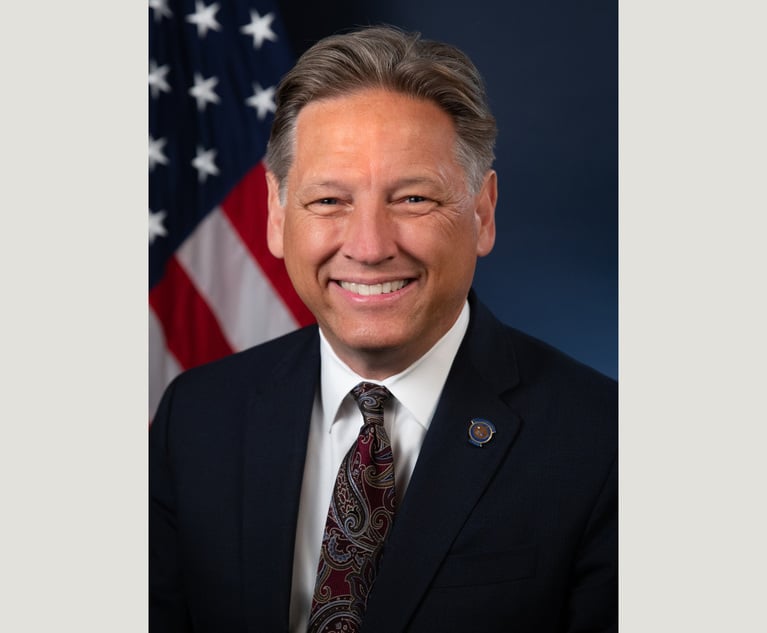Judge Orders Weekend Search for Michael Avenatti's Alleged Missing Financial Data
Avenatti has a mistrial motion pending related to prosecutors' failure to disclose the data to him, and the judge said he can't move forward without determining what information, if any, exists.
August 20, 2021 at 08:25 PM
5 minute read
 Michael Avenatti and his standby counsel Courtney Cummings Cefali outside the Ronald Reagan Federal Building and Courthouse on Aug. 20, 2021. Photo by Meghann M. Cuniff/ALM
Michael Avenatti and his standby counsel Courtney Cummings Cefali outside the Ronald Reagan Federal Building and Courthouse on Aug. 20, 2021. Photo by Meghann M. Cuniff/ALM
A federal judge on Friday ordered prosecutors to allow Michael Avenatti access to his law firm's servers this weekend so he can search for financial records he's made central to his defense against a wire fraud scheme alleging client embezzlement.
U.S. District Judge James V. Selna of the Central District of California said Avenatti is to direct searches "with the government fully present" for a software program called Tabs—the formal name is Tabs3—that his firm's attorneys used to track their time and expenses. Avenatti has a mistrial motion pending related to prosecutors' failure to disclose the data to him, and Selna said he can't move forward without such an inquiry. The judge ordered everyone to return to court at 10:30 a.m. Monday.
One of the main parts of the government's showing "is documentary financial data," Selna said during the 25-minute hearing. "We need to know whether all that has been produced."
The jury is due back at 9 a.m. Tuesday for the 19th day of testimony; Selna on Thursday canceled Friday's scheduled trial day in order to address the Tabs issue.
Assistant U.S. Attorneys Brett Sagel and Alex Wyman say the data is irrelevant, because they've already incorporated Tabs data for two of the four settlements at issue in the case, and Avenatti never provided any client with proper accountings or payment terms. The information was included in emails from Avenatti's paralegal. Co-lead investigator Remoun Karlous, a special agent with the U.S. Treasury, testified Wednesday that one of the other settlements wouldn't allow for significant costs and fees. The fourth didn't allow for them at all because Avenatti was due a flat 7.5% fee.
Avenatti said Friday the issue for the Tabs summaries already entered as evidence is, "do they reflect the most current data as reflected in the database? And that's what we're trying to answer."
After federal agents seized his firm's computer servers in March 2019, Avenatti was allowed to search them through a government agent, with prosecutors pre-approving what he could be given. Avenatti never asked for the Tabs data then, and Sagel told the judge Friday, "Why is it coming up now?"
"Sir, I don't care that it comes to a fine point here," Selna replied. "There's no question that many, many times Mr. Avenatti has challenged the sufficiency of the government's production in terms of various doctrines."
Selna says he accepts "for present purposes" that prosecutors don't have the data, but he said that doesn't answer his "bottom-line question," which is was it part of the documents seized in the search.
"That's the question I need to answer," the judge said. "You may have to work over the weekend, but so be it."
Avenatti has said prosecutors were obligated to produce the data regardless of a specific request, but he also obtained an order from Selna in January reminding prosecutors of their "continuing obligation to produce all information or evidence known to the government that is relevant to the guilt or punishment of a defendant, including, but not limited to, exculpatory evidence." Avenatti argues that should include the Tabs data, particularly after Karlous acknowledged during Avenatti's direct exam of him that Avenatti's paralegal told him in July 2019 the firm used Tabs to track expenses.
The issue involves the so-called taint team process within the U.S. Department of Justice, which outlines how prosecutors are to handle possible attorney-client privileged material seized in investigations. Selna on Friday heard from Assistant U.S. Attorney Patrick Fitzgerald, who led the taint team that searched Avenatti's law firm's servers. Prosecutors were not involved; they obtained materials through Fitzgerald's team after the team reviewed everything and separated out privileged client communications and other information.
"Until very, very recently, we were never asked to produce Tabs information using that terminology," Fitzgerald said. Previous searches focused on the individual clients at issue in the case, he said.
Fitzgerald told Selna the U.S. Attorney's Office searched the servers Thursday for Tabs data and identified some client reports, including the two already entered as exhibits in trial but none relevant to the other two settlements. He said he found no database or body of information that could constitute a Tabs database.
"When we ran Tabs as a standalone search term, we could not find anything that fell within that parameter," Fitzgerald told Selna.
Avenatti said he's "highly confident" something is there.
"They've done word searches. Word searches don't uncover databases. Word searches uncover emails and that sort of" thing, he said.
As they were leaving Selna's courtroom, Avenatti served Fitzgerald with a subpoena. Fitzgerald told him he's not following the proper procedure and there are "regulations." Avenatti asks what the regulations are and Fitzgerald says, "I'm not your counsel, counsel. Come on."
Fitzgerald then told Avenatti they are "Touhy regulations," referring to Department of Justice regulations under United States ex rel. Touhy v. Ragen.
Avenatti retorted with a 2006 U.S. Court of Appeals for the Ninth Circuit case, United States v. Bahamonde, which he said says those regulations don't apply in criminal cases.
"Have a good weekend," Fitzgerald responded.
Fitzgerald asked Sagel on the way out: "You want me to take the subpoena?"
"No. You can do whatever you want with it," Sagel said.
Follow Meghann M. Cuniff on Twitter for live updates from Judge Selna's courtroom.
This content has been archived. It is available through our partners, LexisNexis® and Bloomberg Law.
To view this content, please continue to their sites.
Not a Lexis Subscriber?
Subscribe Now
Not a Bloomberg Law Subscriber?
Subscribe Now
NOT FOR REPRINT
© 2025 ALM Global, LLC, All Rights Reserved. Request academic re-use from www.copyright.com. All other uses, submit a request to [email protected]. For more information visit Asset & Logo Licensing.
You Might Like
View All
California Supreme Court Vacates Murder Conviction in Infant Abuse Case
5 minute read
Biden commutes sentences for 37 of 40 federal death row inmates, including two convicted of California murders
6 minute readTrending Stories
- 1'It's Not Going to Be Pretty': PayPal, Capital One Face Novel Class Actions Over 'Poaching' Commissions Owed Influencers
- 211th Circuit Rejects Trump's Emergency Request as DOJ Prepares to Release Special Counsel's Final Report
- 3Supreme Court Takes Up Challenge to ACA Task Force
- 4'Tragedy of Unspeakable Proportions:' Could Edison, DWP, Face Lawsuits Over LA Wildfires?
- 5Meta Pulls Plug on DEI Programs
Who Got The Work
Michael G. Bongiorno, Andrew Scott Dulberg and Elizabeth E. Driscoll from Wilmer Cutler Pickering Hale and Dorr have stepped in to represent Symbotic Inc., an A.I.-enabled technology platform that focuses on increasing supply chain efficiency, and other defendants in a pending shareholder derivative lawsuit. The case, filed Oct. 2 in Massachusetts District Court by the Brown Law Firm on behalf of Stephen Austen, accuses certain officers and directors of misleading investors in regard to Symbotic's potential for margin growth by failing to disclose that the company was not equipped to timely deploy its systems or manage expenses through project delays. The case, assigned to U.S. District Judge Nathaniel M. Gorton, is 1:24-cv-12522, Austen v. Cohen et al.
Who Got The Work
Edmund Polubinski and Marie Killmond of Davis Polk & Wardwell have entered appearances for data platform software development company MongoDB and other defendants in a pending shareholder derivative lawsuit. The action, filed Oct. 7 in New York Southern District Court by the Brown Law Firm, accuses the company's directors and/or officers of falsely expressing confidence in the company’s restructuring of its sales incentive plan and downplaying the severity of decreases in its upfront commitments. The case is 1:24-cv-07594, Roy v. Ittycheria et al.
Who Got The Work
Amy O. Bruchs and Kurt F. Ellison of Michael Best & Friedrich have entered appearances for Epic Systems Corp. in a pending employment discrimination lawsuit. The suit was filed Sept. 7 in Wisconsin Western District Court by Levine Eisberner LLC and Siri & Glimstad on behalf of a project manager who claims that he was wrongfully terminated after applying for a religious exemption to the defendant's COVID-19 vaccine mandate. The case, assigned to U.S. Magistrate Judge Anita Marie Boor, is 3:24-cv-00630, Secker, Nathan v. Epic Systems Corporation.
Who Got The Work
David X. Sullivan, Thomas J. Finn and Gregory A. Hall from McCarter & English have entered appearances for Sunrun Installation Services in a pending civil rights lawsuit. The complaint was filed Sept. 4 in Connecticut District Court by attorney Robert M. Berke on behalf of former employee George Edward Steins, who was arrested and charged with employing an unregistered home improvement salesperson. The complaint alleges that had Sunrun informed the Connecticut Department of Consumer Protection that the plaintiff's employment had ended in 2017 and that he no longer held Sunrun's home improvement contractor license, he would not have been hit with charges, which were dismissed in May 2024. The case, assigned to U.S. District Judge Jeffrey A. Meyer, is 3:24-cv-01423, Steins v. Sunrun, Inc. et al.
Who Got The Work
Greenberg Traurig shareholder Joshua L. Raskin has entered an appearance for boohoo.com UK Ltd. in a pending patent infringement lawsuit. The suit, filed Sept. 3 in Texas Eastern District Court by Rozier Hardt McDonough on behalf of Alto Dynamics, asserts five patents related to an online shopping platform. The case, assigned to U.S. District Judge Rodney Gilstrap, is 2:24-cv-00719, Alto Dynamics, LLC v. boohoo.com UK Limited.
Featured Firms
Law Offices of Gary Martin Hays & Associates, P.C.
(470) 294-1674
Law Offices of Mark E. Salomone
(857) 444-6468
Smith & Hassler
(713) 739-1250








